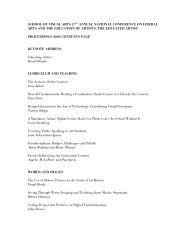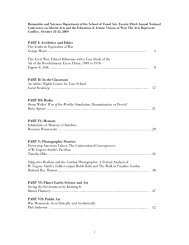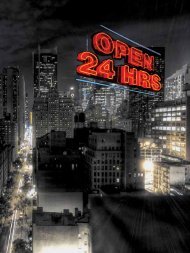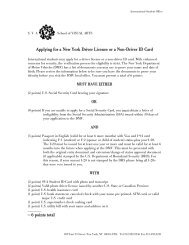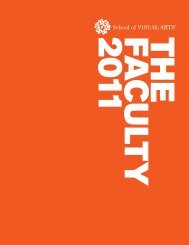SECTION 1 - via - School of Visual Arts
SECTION 1 - via - School of Visual Arts
SECTION 1 - via - School of Visual Arts
You also want an ePaper? Increase the reach of your titles
YUMPU automatically turns print PDFs into web optimized ePapers that Google loves.
determining what we shall forget and what we shall remember, including much that comes to<br />
comprise a collective-past we can never confirm.<br />
Kilstrom concludes his paper with:<br />
In other words, memory is simultaneously a biological fact, a faculty <strong>of</strong> mind,<br />
an exercise in rhetoric, and a social construction.<br />
Today cognitive-science grounds our errors in perception to error in cognition out <strong>of</strong> micromacro-acculturation<br />
and or bio-brain-system damage. In what I reference as factors that<br />
comprise our forming a more or less mature-cognitive-process.<br />
B. Dubrovsky in his article entitled, “Neuroscience and Memory,” begins by speaking <strong>of</strong><br />
memory as a process bound to meaning in cognition, as achieving prominence at least in the<br />
west as early as greek and roman times. Praising Bartlett’s experimental departure from<br />
Ebbinghaus, Dubrovsky points to Bartlett’s insistence on subjectivity as essential<br />
for the true test <strong>of</strong> memory.<br />
He quotes Bartlett:<br />
Remembering is not the re-excitation <strong>of</strong> innumerable fixed, lifeless and<br />
fragmentary traces. It is an imaginative reconstruction, or construction, built<br />
out <strong>of</strong> our relation <strong>of</strong> our attitude towards a whole active mass <strong>of</strong> organized past<br />
reactions or experience, and to a little outstanding detail which commonly<br />
appears in image or in language form. It is thus hardly ever really exact, even in<br />
the most rudimentary cases <strong>of</strong> rote recapitulation, and it is not at all important<br />
that it should be.<br />
Dubrovsky continues with Barlett’s observation that memory and perception always seek to fill<br />
gaps. I assume that it is in the filling <strong>of</strong> the gaps that memory becomes especially inexact. But<br />
inexact-remembering implies forgetting and lying, and the denial within ones own mind, <strong>of</strong><br />
both. I propose that to the extent that memory, that remembering is led by the limbic-system,<br />
inhibiting abstract-cognition, that this is the case. I propose that when memory and perception<br />
are led by abstract-cognition in free-will in intellect that poetic-elaboration and therefore error<br />
is radically minimized.<br />
Gerald Edelman the noble prize winning biologist in the early nineties provided a bio-chemical<br />
basis <strong>of</strong> memory, linking psychology and biology, with his theory <strong>of</strong> re-entry, at least within the<br />
bio-brain limbic-dominant monkey. Edelmans theory speaks <strong>of</strong> a<br />
synaptic-global-mapping, wherein groups <strong>of</strong> neurons are selected in a map, simultaneously with<br />
others grouped in their separate re-entry connected selected maps, in a process wherein<br />
perception is correlated and coordinated and strengthened by the strengthening <strong>of</strong> the<br />
interconnections through the reentrant signaling. Dubrovsky extends Edelmans theory, viewing<br />
the relation <strong>of</strong> memory to perception, as specific to our ability to re-categorize previousperceptual-categorizations.<br />
40



